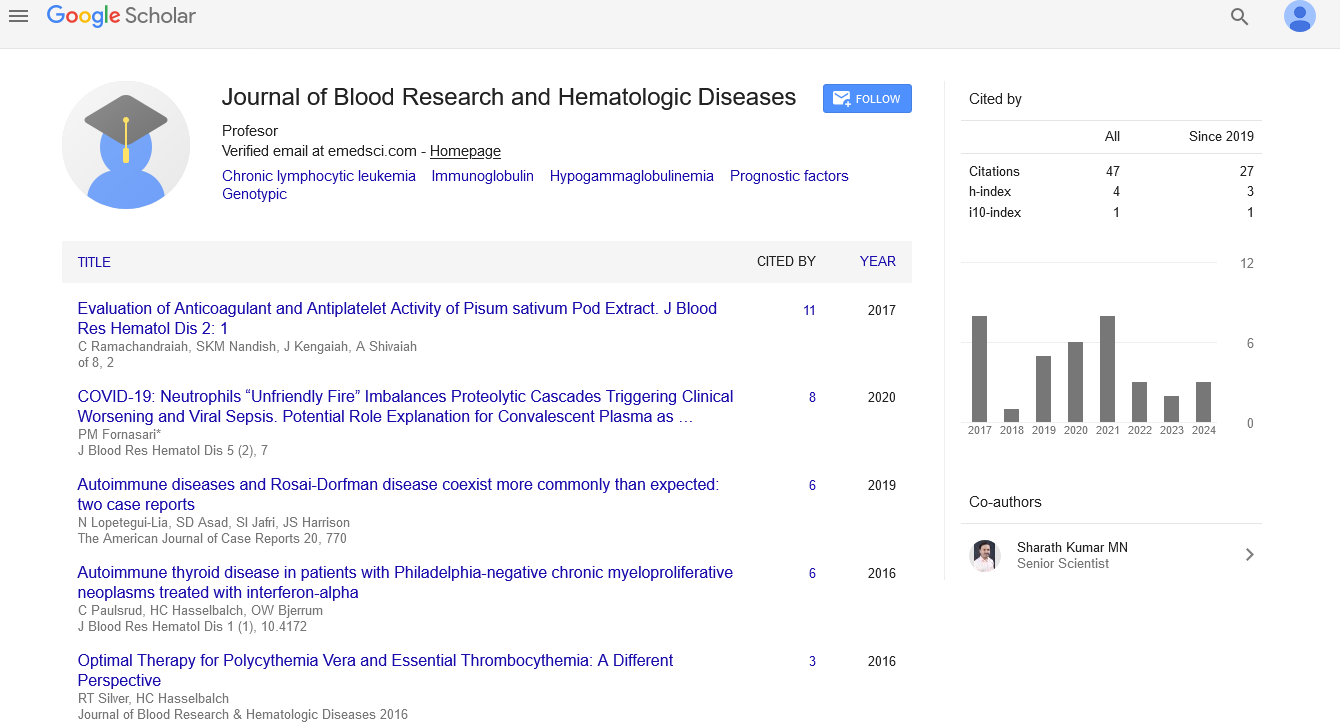Opinion Article, J Blood Res Hematol Dis Vol: 8 Issue: 2
Emerging Therapies and Innovative Methods for Effective Management of Thrombosis
Rachel Scott*
1Department of Haematology, Imperial College Healthcare NHS Trust, London, United Kingdom
*Corresponding Author: Rachel Scott,
Department of Haematology, Imperial
College Healthcare NHS Trust, London, United Kingdom
E-mail: scottrachel@gmail.com
Received date: 29 May, 2023, Manuscript No. JBRHD-23-106789;
Editor assigned date: 31 May, 2023, PreQC No. JBRHD-23-106789 (PQ);
Reviewed date: 14 June, 2023, QC No. JBRHD-23-106789;
Revised date: 21 June, 2023, Manuscript No. JBRHD-23-106789 (R);
Published date: 28 June, 2023, DOI: 10.4172/jbrhd.1000169
Citation: Scott R (2023) Emerging Therapies and Innovative Methods for Effective Management of Thrombosis. J Blood Res Hematol Dis 8:2.
Description
Thrombosis, the formation of blood clots within blood vessels, remains a significant medical challenge with potential life-threatening consequences. This manuscript explores the latest developments in thrombosis management, focusing on emerging therapies and innovative approaches aimed at improving treatment outcomes. From novel anticoagulants to cutting-edge interventions, the future of thrombosis management holds exciting possibilities for patients at risk.
Thrombosis, encompassing both arterial and venous clot formation, is associated with a range of clinical conditions, including heart attacks, strokes, and Deep Vein Thrombosis (DVT). Traditional anticoagulant therapies, such as warfarin and heparin, have been instrumental in preventing thrombotic events. However, recent advancements in thrombosis studies have led to the development of newer, more targeted therapies.
Direct Oral Anticoagulants (DOACs): Direct oral anticoagulants, including rivaroxaban, apixaban, dabigatran, and edoxaban, have emerged as alternatives to traditional anticoagulants like warfarin. These agents directly inhibit specific clotting factors, offering more predictable and reliable anticoagulation. DOACs have shown comparable or superior efficacy and safety profiles, with reduced risks of bleeding complications compared to warfarin. Their ease of use and lack of need for regular monitoring make them attractive choices for thrombosis management.
Targeting thrombotic pathways: Advances in molecular and cellular studies have revealed various targets within the thrombotic pathways. Novel therapies are being developed to specifically block or modulate these targets, aiming to provide more precise and effective anticoagulation. These targeted approaches hold promise in reducing bleeding risks associated with broad-spectrum anticoagulants while maintaining therapeutic benefits.
Thrombolysis and thrombectomy innovations: In acute thrombotic events, such as ischemic strokes and massive pulmonary embolisms, rapid restoration of blood flow is important. Thrombolytic therapies, which involve administering clot-dissolving agents, have been instrumental in achieving reperfusion. However, recent innovations in endovascular techniques have revolutionized thrombectomy procedures, allowing for mechanical removal of large clots. These advancements have significantly improved outcomes for patients with acute thrombotic events.
Personalized antiplatelet therapies: Platelet inhibition is vital in preventing arterial thrombosis. Individual variations in platelet response to antiplatelet drugs have led to the development of personalized antiplatelet therapy strategies. Genetic testing and platelet function testing allow for tailored treatment regimens, ensuring optimal platelet inhibition while minimizing the risk of bleeding.
Nanotechnology in thrombosis management: Nanotechnology has opened new possibilities in drug delivery and targeted therapy. Nanoformulations of anticoagulants and antiplatelet drugs have shown improved pharmacokinetics, reduced side effects, and enhanced targeting to the site of thrombosis. These nanomedicines hold the potential to revolutionize thrombosis management by improving treatment efficacy and patient adherence.
Multidisciplinary approach to thrombosis management: Thrombosis management requires a multidisciplinary approach involving physicians, pharmacists, nurses, and other healthcare professionals. Effective communication and collaboration among healthcare teams are essential to ensure seamless care, timely interventions, and patient education. Implementing comprehensive thrombosis management protocols enhances patient outcomes and reduces the burden of thrombotic complications.
Future challenges and opportunities: Despite the remarkable advancements in thrombosis management, challenges remain, including identifying optimal treatment strategies for special populations, addressing bleeding risks associated with anticoagulant therapy, and fostering patient adherence to long-term treatment regimens. Continued studies, clinical trials, and translational studies will be instrumental in addressing these challenges and refining thrombosis management strategies.
Conclusion
Thrombosis management has evolved significantly, with emerging therapies and innovative approaches paving the way for more effective and safer treatments. From direct oral anticoagulants to targeted therapies and nanomedicines, the future of thrombosis management holds exciting possibilities for patients at risk. A comprehensive and multidisciplinary approach to thrombosis management, coupled with ongoing studies and collaboration, will continue to improve patient outcomes and reduce the impact of thrombotic events on global health.
 Spanish
Spanish  Chinese
Chinese  Russian
Russian  German
German  French
French  Japanese
Japanese  Portuguese
Portuguese  Hindi
Hindi 